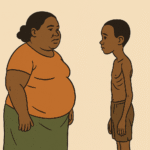Malnutrition in Africa: Causes, Consequences & Solutions

Malnutrition remains one of Africa’s greatest health challenges. Despite the continent’s rich agricultural heritage, millions of children and adults suffer from undernutrition, micronutrient deficiencies, and obesity—a phenomenon known as the double burden of malnutrition. From rural villages to urban centers, the lack of access to nutritious food threatens health, productivity, and development. This article explores the causes, consequences, and solutions to Africa’s malnutrition crisis.
1. Understanding Malnutrition in Africa
Malnutrition is not just about hunger. It includes:
-
Undernutrition – insufficient calories, protein, and nutrients.
-
Micronutrient deficiencies – lack of essential vitamins and minerals like iron, vitamin A, and iodine.
-
Overnutrition – excess calories leading to obesity and diet-related diseases.
In Africa, many households face both extremes—children stunted by poor diets while adults struggle with obesity caused by cheap processed foods.
2. Causes of Malnutrition
Several interlinked factors drive Africa’s nutrition crisis:
a) Poverty and Food Insecurity
Many families cannot afford diverse, nutritious foods. Diets are often based on starchy staples like maize, cassava, or rice, with little protein or vegetables.
b) Climate Change and Agriculture
Unpredictable rains, droughts, and floods disrupt farming, reducing food supply and raising prices.
c) Urbanization and Fast Foods
As African cities grow, processed and fast foods replace traditional diets. These foods are cheap, filling, but low in nutrients.
d) Poor Health Systems
Limited maternal care, lack of nutrition education, and weak health systems contribute to high rates of malnutrition in children.
e) Conflict and Displacement
Wars and displacement in regions like the Sahel, Sudan, and Congo leave millions dependent on food aid, which is often insufficient.
3. Consequences of Malnutrition
Malnutrition has devastating long-term effects:
-
Child Stunting: Over 30% of African children under 5 are stunted, meaning they are too short for their age due to poor nutrition.
-
Increased Disease Burden: Malnourished individuals have weakened immune systems, making them more vulnerable to infections.
-
Reduced Productivity: Adults who were malnourished as children have lower education and earning potential, fueling cycles of poverty.
-
Rising Non-Communicable Diseases (NCDs): Obesity and poor diets increase cases of diabetes, hypertension, and heart disease in Africa’s cities.
4. Solutions to Malnutrition in Africa
a) Promoting Traditional African Diets
Reintroducing nutrient-rich local foods such as millet, sorghum, fonio, moringa, and legumes can reduce dependency on imported processed foods.
b) Food Fortification
Adding vitamins and minerals to staple foods (like fortified flour, salt, and cooking oil) can address widespread deficiencies.
c) Nutrition Education
Teaching communities about balanced diets, breastfeeding, and healthy cooking practices empowers families to make better food choices.
d) Improving Agriculture
Investing in climate-smart farming, irrigation, and local food value chains ensures availability of diverse foods year-round.
e) Strengthening Social Protection
School feeding programs, subsidies for healthy foods, and targeted support for vulnerable families can improve nutrition outcomes.
f) Partnerships and Innovation
Public-private partnerships, NGOs, and governments can work together to reduce food waste, distribute fortified foods, and support nutrition startups.
5. Success Stories and Hope
Countries like Rwanda, Ethiopia, and Ghana have made progress through national nutrition strategies, school feeding programs, and investments in agriculture. If scaled, these initiatives could help Africa meet the UN Sustainable Development Goal 2: Zero Hunger by 2030.
Conclusion
Malnutrition in Africa is a complex but solvable crisis. By combining traditional wisdom, modern science, and strong policies, Africa can fight both undernutrition and obesity. The health and future of the continent depend on how quickly we act to ensure every African has access to nutritious food.
Written by Fawzi Rufai, Medically Reviewed by Sesan Kareem



